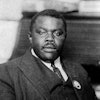Africa:Through Skip Gates’ Eyes
In his poem “Heritage,” Harlem Renaissance poet Countee Cullen once asked, “What is Africa to me?” Harvard University’s Dr. Henry Louis “Skip” Gates Jr. struggles with the very same question in a PBS documentary that will air next month over the course of three nights.
Throughout the six-part Wonders of the African World, hosted and written by Gates, there is an ever-present tension between his romanticized view of the motherland and the hard realities of race and identity on the continent.
While celebrating the culture and searching for the great ancient civilizations of Africa, Gates pursues the task of reconciling his own feelings about a lost history as well as challenging the viewers’ Western-influenced myths about the continent.
But what Gates does best in this documentary — amidst a colorful backdrop of stunning landscapes and interesting people — is tell stories. Stories from his childhood, stories from his first travels to Africa as a student, and stories of a great African past are all intricately woven together like the threads of a piece of kente cloth.
He begins the series by telling stories of the Black Pharaohs that he heard as a child. Gates admits that in his youth he never really believed that there actually were Black men and women called Nubians who ruled all of Egypt.
Discovering that the ancient kingdom of Nubia was real, therefore, was especially jarring for this young West Virginia boy who had been reared in a world that demanded “White was right.”
Gates travels from Cairo to Aswan, Egypt, in search of ancient Nubia only to discover that the gateway to the original city is covered by the Nile because of the Aswan dam built in 1960.
In Sudan, however, he exhibits shear joy while walking through the lost city of Meroe — a royal capital and Nubian trading center for almost 1,000 years — on the site of what may have been a college or university.
“That must have been the department of Nubian studies over there,” he jokes with his guide. In Meroe’s pyramids, Gates marvels at the pictograms of the Black Pharaohs and the fact he’s the only tourist visiting these tombs in comparison to the crowded pyramids of Giza in Egypt. The series is full of ironies like this.
Sailing down the East Coast of Africa in search of the Swahili culture, he finds a people reluctant to claim their African ancestry, preferring to claim the parentage of Arab and Persian settlers, which brings higher social status.
As he learns more about the 2,000-year-old culture created from an amalgamation of Arab and African culture, Gates is reminded of the old saying, “If you’re White, you’re all right. If you’re Brown, stick around. But if you’re Black, get back.”
Given the all-too-familiar land mines of race and identity in American culture, he understands the reluctance of the Swahili but finds it difficult to understand how some African kingdoms thrived from the sale of their own people to the New World.
In the third installment of the documentary, Gates travels to the slave-trading kingdoms of Asante and Dahomey in present-day Ghana and Benin. While Europeans transported some 11 million Africans across the Atlantic, it was the Africans who raided villages and sold other Africans to the Europeans.
At the port of Ouidah in Benin, on the very shore where Africans were loaded on ships to become human cargo, Gates talks with Martine De Souza, a descendant of a notorious Brazilian slave trader.
Because of the roles their ancestors played in the world drama called slavery, a divide as wide as the Middle Passage separates the two. But they share a very emotional moment wondering how they could change the painful past they share.
While Wonders of the African World seriously explores this emotionally charged past, it also does its best to be light-hearted. Some of the documentary’s brightest moments are when Gates marvels like a schoolboy at the continent’s sheer magnificence.
In one scene, he sports a Harvard T-shirt with white socks and Docksiders peeking out from beneath an African wrap. At a later moment, he disrobes down to his boxers to experience the healing properties of the Sudanese sand.
Such moments capture Gates as the quintessential American tourist, despite the distant link he may have to the African people he encounters. He seems aware of that irony, making humorous efforts to fit in. An example, during the first episode, finds him asking a T-shirt merchant in Cairo to give him the Nubian price.
After 12 months of filming in a dozen African locales, it would seem that Gates has discovered that Africa is many things to him — simultaneously magical, mystical and monstrous.
Through his eyes, viewers experience all the cultural richness of the motherland, and through his scholarly examination, they bear witness to its complexities. Gates succeeds at shining much welcome light on the so-called “dark” continent.
At the end of one episode he asks, “Why should we expect African history to be less messy or less complicated than anywhere else?”
© Copyright 2005 by DiverseEducation.com



















